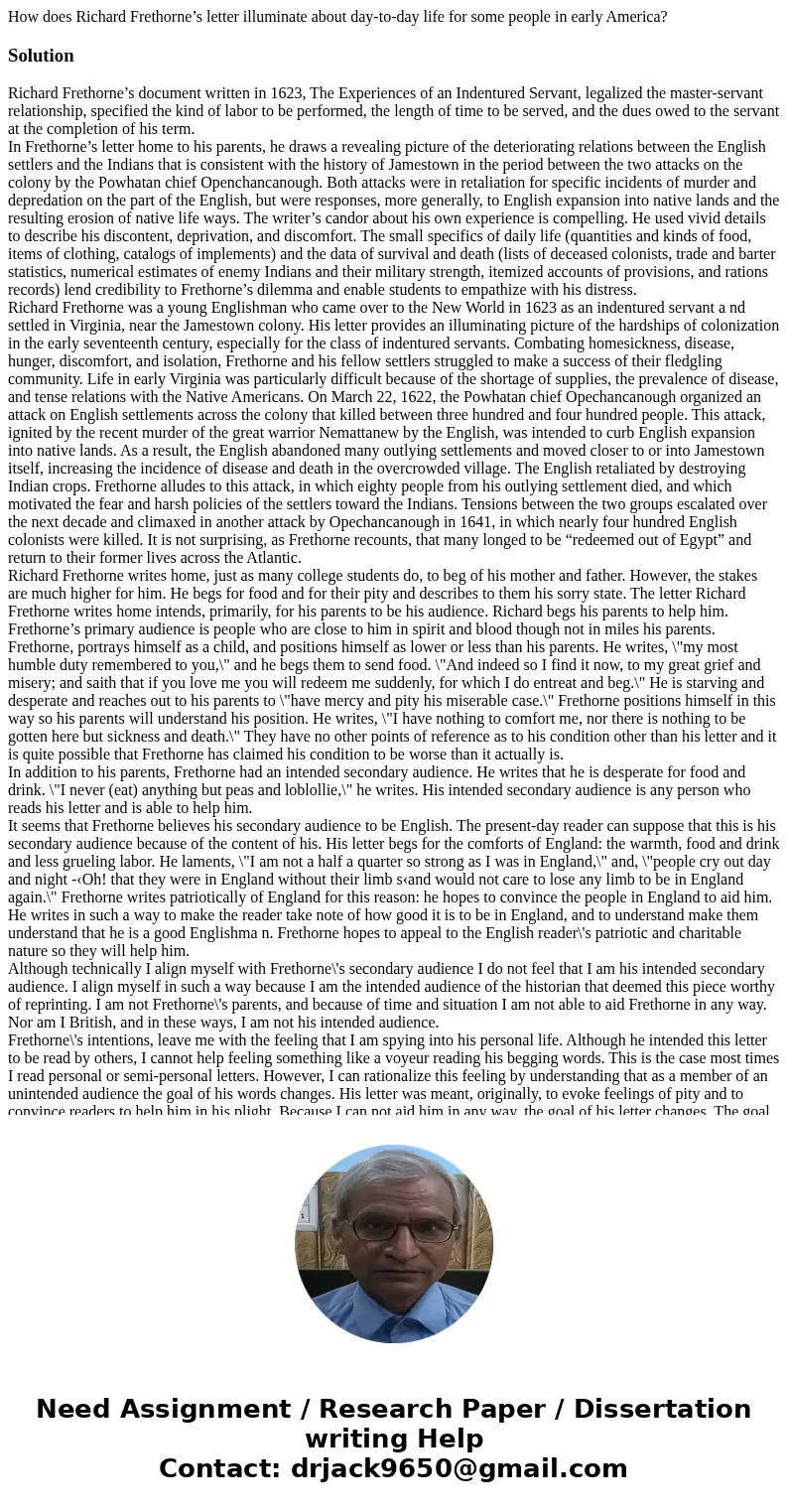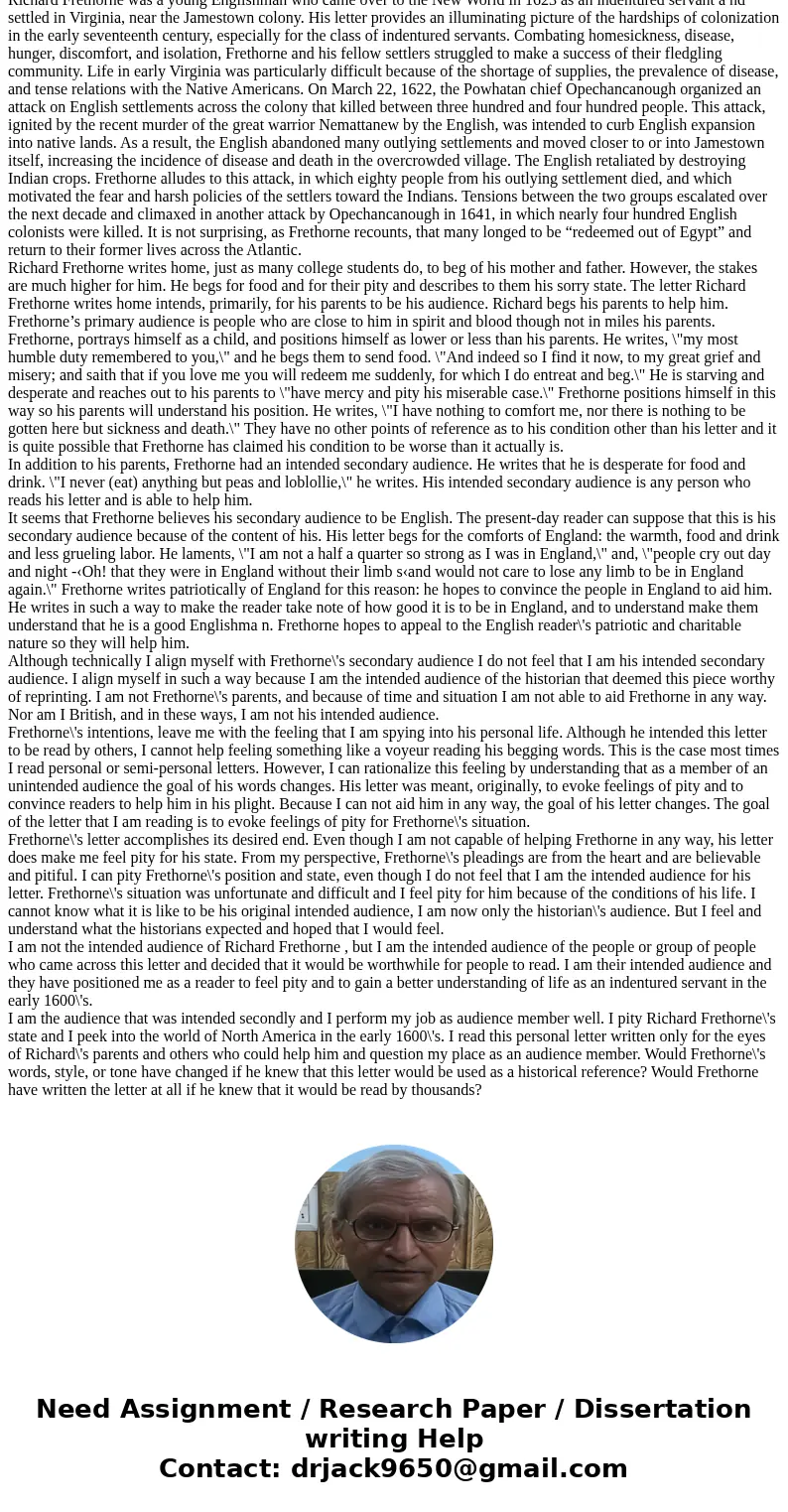How does Richard Frethornes letter illuminate about daytoday
How does Richard Frethorne’s letter illuminate about day-to-day life for some people in early America?
Solution
Richard Frethorne’s document written in 1623, The Experiences of an Indentured Servant, legalized the master-servant relationship, specified the kind of labor to be performed, the length of time to be served, and the dues owed to the servant at the completion of his term.
In Frethorne’s letter home to his parents, he draws a revealing picture of the deteriorating relations between the English settlers and the Indians that is consistent with the history of Jamestown in the period between the two attacks on the colony by the Powhatan chief Openchancanough. Both attacks were in retaliation for specific incidents of murder and depredation on the part of the English, but were responses, more generally, to English expansion into native lands and the resulting erosion of native life ways. The writer’s candor about his own experience is compelling. He used vivid details to describe his discontent, deprivation, and discomfort. The small specifics of daily life (quantities and kinds of food, items of clothing, catalogs of implements) and the data of survival and death (lists of deceased colonists, trade and barter statistics, numerical estimates of enemy Indians and their military strength, itemized accounts of provisions, and rations records) lend credibility to Frethorne’s dilemma and enable students to empathize with his distress.
Richard Frethorne was a young Englishman who came over to the New World in 1623 as an indentured servant a nd settled in Virginia, near the Jamestown colony. His letter provides an illuminating picture of the hardships of colonization in the early seventeenth century, especially for the class of indentured servants. Combating homesickness, disease, hunger, discomfort, and isolation, Frethorne and his fellow settlers struggled to make a success of their fledgling community. Life in early Virginia was particularly difficult because of the shortage of supplies, the prevalence of disease, and tense relations with the Native Americans. On March 22, 1622, the Powhatan chief Opechancanough organized an attack on English settlements across the colony that killed between three hundred and four hundred people. This attack, ignited by the recent murder of the great warrior Nemattanew by the English, was intended to curb English expansion into native lands. As a result, the English abandoned many outlying settlements and moved closer to or into Jamestown itself, increasing the incidence of disease and death in the overcrowded village. The English retaliated by destroying Indian crops. Frethorne alludes to this attack, in which eighty people from his outlying settlement died, and which motivated the fear and harsh policies of the settlers toward the Indians. Tensions between the two groups escalated over the next decade and climaxed in another attack by Opechancanough in 1641, in which nearly four hundred English colonists were killed. It is not surprising, as Frethorne recounts, that many longed to be “redeemed out of Egypt” and return to their former lives across the Atlantic.
Richard Frethorne writes home, just as many college students do, to beg of his mother and father. However, the stakes are much higher for him. He begs for food and for their pity and describes to them his sorry state. The letter Richard Frethorne writes home intends, primarily, for his parents to be his audience. Richard begs his parents to help him. Frethorne’s primary audience is people who are close to him in spirit and blood though not in miles his parents. Frethorne, portrays himself as a child, and positions himself as lower or less than his parents. He writes, \"my most humble duty remembered to you,\" and he begs them to send food. \"And indeed so I find it now, to my great grief and misery; and saith that if you love me you will redeem me suddenly, for which I do entreat and beg.\" He is starving and desperate and reaches out to his parents to \"have mercy and pity his miserable case.\" Frethorne positions himself in this way so his parents will understand his position. He writes, \"I have nothing to comfort me, nor there is nothing to be gotten here but sickness and death.\" They have no other points of reference as to his condition other than his letter and it is quite possible that Frethorne has claimed his condition to be worse than it actually is.
In addition to his parents, Frethorne had an intended secondary audience. He writes that he is desperate for food and drink. \"I never (eat) anything but peas and loblollie,\" he writes. His intended secondary audience is any person who reads his letter and is able to help him.
It seems that Frethorne believes his secondary audience to be English. The present-day reader can suppose that this is his secondary audience because of the content of his. His letter begs for the comforts of England: the warmth, food and drink and less grueling labor. He laments, \"I am not a half a quarter so strong as I was in England,\" and, \"people cry out day and night -‹Oh! that they were in England without their limb s‹and would not care to lose any limb to be in England again.\" Frethorne writes patriotically of England for this reason: he hopes to convince the people in England to aid him. He writes in such a way to make the reader take note of how good it is to be in England, and to understand make them understand that he is a good Englishma n. Frethorne hopes to appeal to the English reader\'s patriotic and charitable nature so they will help him.
Although technically I align myself with Frethorne\'s secondary audience I do not feel that I am his intended secondary audience. I align myself in such a way because I am the intended audience of the historian that deemed this piece worthy of reprinting. I am not Frethorne\'s parents, and because of time and situation I am not able to aid Frethorne in any way. Nor am I British, and in these ways, I am not his intended audience.
Frethorne\'s intentions, leave me with the feeling that I am spying into his personal life. Although he intended this letter to be read by others, I cannot help feeling something like a voyeur reading his begging words. This is the case most times I read personal or semi-personal letters. However, I can rationalize this feeling by understanding that as a member of an unintended audience the goal of his words changes. His letter was meant, originally, to evoke feelings of pity and to convince readers to help him in his plight. Because I can not aid him in any way, the goal of his letter changes. The goal of the letter that I am reading is to evoke feelings of pity for Frethorne\'s situation.
Frethorne\'s letter accomplishes its desired end. Even though I am not capable of helping Frethorne in any way, his letter does make me feel pity for his state. From my perspective, Frethorne\'s pleadings are from the heart and are believable and pitiful. I can pity Frethorne\'s position and state, even though I do not feel that I am the intended audience for his letter. Frethorne\'s situation was unfortunate and difficult and I feel pity for him because of the conditions of his life. I cannot know what it is like to be his original intended audience, I am now only the historian\'s audience. But I feel and understand what the historians expected and hoped that I would feel.
I am not the intended audience of Richard Frethorne , but I am the intended audience of the people or group of people who came across this letter and decided that it would be worthwhile for people to read. I am their intended audience and they have positioned me as a reader to feel pity and to gain a better understanding of life as an indentured servant in the early 1600\'s.
I am the audience that was intended secondly and I perform my job as audience member well. I pity Richard Frethorne\'s state and I peek into the world of North America in the early 1600\'s. I read this personal letter written only for the eyes of Richard\'s parents and others who could help him and question my place as an audience member. Would Frethorne\'s words, style, or tone have changed if he knew that this letter would be used as a historical reference? Would Frethorne have written the letter at all if he knew that it would be read by thousands?


 Homework Sourse
Homework Sourse